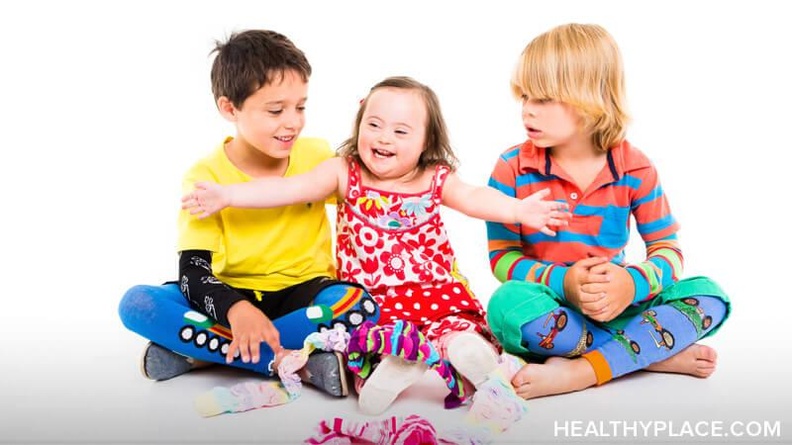Help for Siblings of a Child with Special Needs / Behavior Problems

Siblings of children with special needs or social-emotional problems face a host of issues. Learn how to help the siblings of your special needs child.
A parent writes: What advice do you have for siblings of children with special needs and emotional and social problems? Our younger daughter alternates between fear, sorrow, and embarrassment in her responses to her older sister. Our older daughter's moody, unpredictable nature makes it hard to trust that she won't explode without warning. How can we help our child handle having such a difficult sister?
The Problems for Siblings of a Child with Special Needs
Siblings of volatile children tread a thin line between friend and enemy in the minds of their brothers and sisters. These relationships ride an uneasy tide of intermittent emotional storms as siblings witness outbursts that rattle their own foundations. Siblings can also serve as targets of rage, blame and provocation. Therefore, it's not uncommon for the "well child" to join the ranks of the symptomatic, with anxiety, sleeplessness, and extreme inhibition among some of the ill effects.
Parents tend to devote such a disproportionate amount of time and attention to the high maintenance child that siblings may feel slighted, or even worse, eventually follow in the demanding footsteps of their brothers or sisters. While the goal of providing a relatively smooth family life is unrealistic when one child regularly disturbs the family peace, feelings of safety and security can be enhanced.
Parenting Siblings of a Special Needs Child Around the Behavior of the Difficult Child
Consider the following parenting suggestions to help raise children without deep sibling-based scars:
Explanations provide some relief from fear and anxiety. Parents may overlook the need to speak to the other children about the extreme behaviors of the volatile child. Information can be shared in order to provide context, lessen guilt and resentment, and preserve the sibling bonds as much as possible. These explanations should be appropriate to the age and cognitive levels of the other children, and should neither condone nor condemn the inappropriate behaviors.
Explanations are best offered in a one-to-one setting, using a commonsense format that doesn't stigmatize the offending child. For example, parents can refer to self-control or mood swings by explaining how some people are born with more or less ability to use their thinking side to control their reacting side. When outbursts occur seemingly without warning, parents can explain how reacting side triggers are at work. If siblings feel responsible, parents can assure them that although they might have a role the reactions triggered are far more excessive than is fair and reasonable. Such discussions are also opportunities to discuss compassion, forgiveness, and accepting what is not under our control.
Coach strategies they can use to increase their sense of safety. Younger siblings, in particular, are especially in need of tools to take shelter when exposed to storms of emotion. One way is to guide them in creating their own "trouble bubble" that represents a pretend mental place to distract themselves from the conflict and chaos going on around them. Stress how their "picture mind" (visual imagery) and favorite activities can help them create a bubble of protection. Suggest that they decide what they want to place within their bubble and encourage them to "enter" when trouble begins. Older siblings often need to be coached in the skill of knowing when to back off from trying to aid their distressed brother or sister. Unfortunately, the intention to help or calm their sibling down can easily be viewed as a provocation or put down by the more emotional child. Point out how good intentions can quickly backfire and why it's usually wiser to allow parents to handle the job of "putting out fires."
Discourage and preempt inappropriate modeling on the part of siblings. Parents often worry that other children, and particularly younger ones, will "learn the wrong lessons" from the troubled child. This can be diminished by teaching younger siblings about the powerful effects of observational learning. Explain how by watching certain behaviors they can become stored in the mind like computers store files. Those files can "open" with bad behaviors when similar circumstances happen. Ensure that the storage process takes place along with input from parents. This input should emphasize the unhappy and self-defeating consequences of the inappropriate behaviors, and also refer to the negative outcome certain actions have upon friendships.
Encourage questions, comments, and above all, make this private dialogue part of your ongoing relationship with siblings. These sensitive issues can not be handled in a "once and done" discussion.
Occasionally probe the thoughts of your other children, but be prepared that you may not like everything you hear. Older children may be especially critical of your handling of the difficult child. Do not allow your ego wounds to send the message that you can't handle listening to their opinions. Remember that siblings observe you trying to soothe the reactions of their brother or sister, so be prepared to give them the benefit of an open mind. Suggest that you understand their point of view (this doesn't mean you necessarily agree) and will give it consideration. Should they wish to discuss individual incidents, it's best to allow it. This may be their way of trying to take an objective stance so that they don't fall victim to modeling or symptoms born out of stress.
APA Reference
Richfield, S.
(2019, August 6). Help for Siblings of a Child with Special Needs / Behavior Problems, HealthyPlace. Retrieved
on 2026, March 4 from https://www.healthyplace.com/parenting/the-parent-coach/help-for-siblings-of-difficult-children



